Fresh start for German-African relations
New approaches and technologies for a sustainable partnership
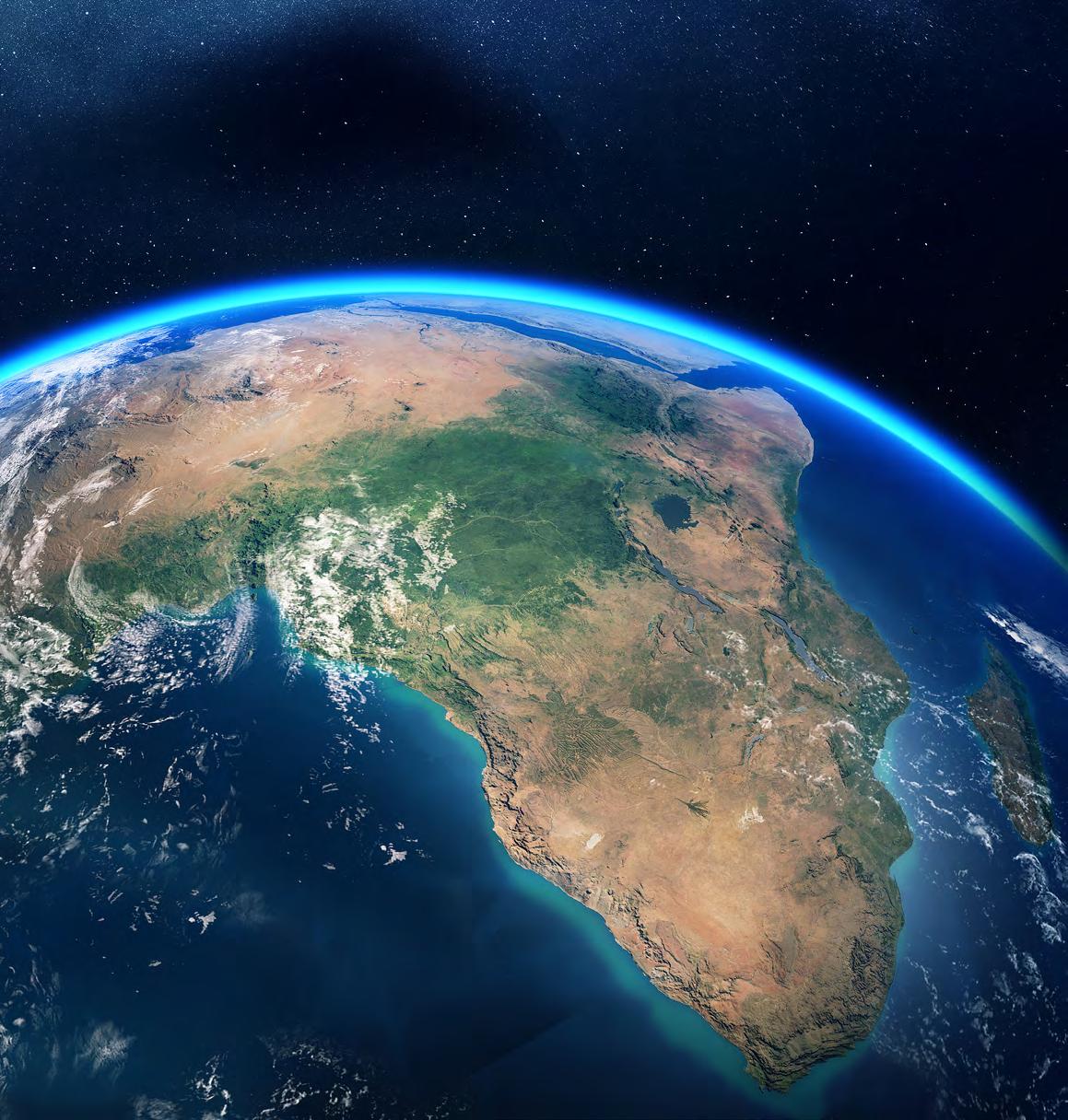
POSITION | AFRICA POLICY | CONTINENT OF OPPORTUNITIES
Digital version
Simply scan the QR code with your smartphone or tablet and access the digital version.
www.bdi.eu/publikation/news/Neustart-der-deutsch-afrikanischen-Beziehungen
V.08.11.10
3 Fresh start for German-African relations Position | Africa policy | Continent of opportunities Table of contents Table of contents Foreword 4 Introduction ...................................................................................................................................................................................... 6 01. Support the implementation of the African Continental Free Trade Area 10 02. Use green hydrogen for win-win partnerships 12 03. Establish sustainable raw material cooperations ....................................................................................................... 16 04. Use future technologies 20 05. Dovetail development cooperation and foreign trade promotion 24 06. Expand infrastructure 27 07. Create opportunities through education ....................................................................................................................... 30 08. Correlate climate protection, nutrition, and food production 32 09. Strengthen cooperation for prevention of pandemics 34 Sources............................................................................................................................................................................................. 36 Imprint 38
Siegfried Russwurm
BDI President
“Africa is rapidly gaining importance for Germany, both strategically and economically. The continent is crucial for reducing the distinct dependence of individual industries on Asian markets. At the same time, it is the key to many raw materials and to green hydrogen. This opens up entirely new opportunities for eye-level cooperation.”

Foreword
The world is changing. The COVID-19 pandemic, the Russian war of aggression on Ukraine in violation of international law with resulting price and supply crises for energy and raw materials, rising inflation and increasing protectionism are hampering supply chains and slowing down the global economy. Additionally, there are challenges like climate change and the associated energy and mobility transition. China is increasingly turning into a systemic rival. In many areas, Europe, and Germany in particular, has become unilaterally dependent on Beijing. Geopolitical disposals are putting us under pressure. To reduce dependencies, companies must increasingly diversify their supply chains and sales markets. Germany needs Africa as a strategic partner. Until now, German companies are being underrepresented on our neighbouring continent. A fresh start in German-African relations is both
a necessity and an opportunity. Our goal should be a new partnership at eye-level.
For the Federation of German Industries (BDI), three topics should be in the focus: the implementation of the African Continental Free Trade Area (AfCFTA), cooperation in the area of raw material supply, especially metals and green hydrogen, and the use of new technologies in all economic sectors.
54 of the 55 African countries have signed the Pan-African Free Trade Area Agreement. The AfCFTA creates a market of 1.3 billion people and an economic bloc with a cumulative gross domestic product of US$3.4 trillion. A reduction in intra-African economic barriers would also improve the continent’s attractiveness for German investment. The World Bank estimates that continental
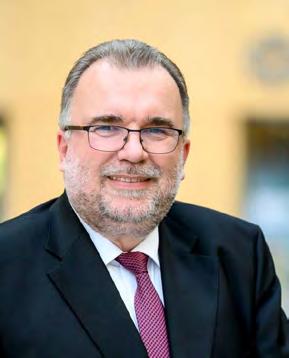
trade would increase by 81 percent with the implementation of the agreement, and exports would increase by 19 percent overall. German development policy should make the implementation of the AfCFTA a priority and actively support African partners in its implementation.
Metallic raw materials such as cobalt, lithium and platinum group metals are of particular importance for the energy transition and the industry’s green transformation. Without them, there will be no electromobility, no digitalisation and no Industry 4.0. The global demand for raw materials will continue to rise. Some African countries have large quantities of these resources. Intensified cooperation with African partners regarding raw material policy should therefore be a focus. Creating a win-win situation should be the goal: Extracting and processing raw materials locally whilst securing supplies for German companies.
Green hydrogen is a key element to energy transition. Demand will therefore rise sharply, especially in Germany. Many African countries have both the climatic and the meteorological conditions to produce green hydrogen. German companies are well positioned as technology leaders in many areas of the hydrogen value chain. Germany should therefore act as a “first mover” in Africa. That way, hydrogen can act as a bridge between Germany’s energy transition and the African continent.
The fourth industrial revolution is also tangible in Africa. Use of new technologies is advancing the development of both society and economy. Internet from space is a gamechanger for remote and rural regions. Networking is the basis for digitisation, economic participation, and prosperity. Numerous new space companies are already using satellite data to improve agricultural production or to detect and combat environmental disasters such as wildfires more quickly. Digital solutions can increase tax revenues and fight corruption. Recently, mobile technologies and services have created 1.7 million direct jobs and brought US$15.6 billion into the public sector through taxes. At US$144 billion in revenue, that accounts for nearly ten percent of the GDP 1. Germany should therefore advocate for the planned EU satellite constellation to cover the African continent, too.
With its new Sub-Saharan Africa strategy, the BDI is presenting precise recommendations for a fresh start of Germany’s cooperation with Africa. The aim is to raise awareness of Africa’s importance as a strategic partner and to identify new ways to deepen and expand the partnership, considering mutual interests.
 Wolfgang Niedermark Member of the Executive Board, BDI
Marie-Christine von Hahn Chair of the BDI Working Group “Development Policy”
Wolfgang Niedermark Member of the Executive Board, BDI
Marie-Christine von Hahn Chair of the BDI Working Group “Development Policy”

Position | Africa policy | Continent of opportunities 5 Fresh start for German-African relations Table of contents
1 The Fourth Industrial Revolution and digitization will transform Africa into a global powerhouse (brookings.edu)
Introduction
Africa is facing major challenges. To overcome these together, it is time for a partnership between Germany and the African countries at eye level.
Since 2000, Sub-Saharan Africa’s growth figures have regularly exceeded the average economic growth of the global economy.2 In many countries, a middle-class has emerged, increasingly demanding a say in politics. Compared to its European equivalents, however, this middle-class was significantly less affluent and still small in relation to the total population. By the time of the global price increases in 2022, price levels had stabilised in most countries - inflation rates of more than ten percent, which had been a regular occurrence during the last century, had become rare.3
%
of German companies in Africa want to intensify their engagement on the continent in the future.
Numerous countries have implemented reforms to improve their business environment. This included, for example, significantly speeding up bureaucratic processes. In many countries, the number of start-ups has increased massively. In metropolises such as Nairobi, Lagos or Accra, vibrant start-up scenes have emerged. Even if this so far has only resulted in few large, successful companies, it nevertheless demonstrates the innovative power and potential of new technologies.
Numerous free trade agreements strengthen intra-African competition and economic growth. Especially the African Continental Free Trade Agreement (AfCFTA) can do more than any other factor to boost Africa’s economic growth.
New challenges
Most recently, the continent has again seen an increase in negative developments. The COVID-19 crisis led to economic slumps due to lockdowns, closed borders and interrupted supply chains. Russia’s war of aggression on Ukraine and the resulting price increases for food, gasoline and other goods are causing extreme hardship in some areas. Climate change is causing droughts and makes swaths of land uninhabitable. In addition, there is increasing political instability. In 2020, war broke out again in Ethiopia’s Tigray region after seemingly successful peace negotiations. The security situation in West African countries is also worsening massively. In 2022, Burkina Faso experienced two military coups within eight months.
2 Cf. World Bank Data (2022a)
3 Cf. World Bank Data (2022b)
6 Position | Africa policy | Continent of opportunities Introduction Fresh start for German-African relations
70
Source: Federation of German Industries: Business survey „German entrepreneurial engagement in Africa 2022“. 2022
Geostrategic importance
Countries such as China, Turkey and Russia have recognised the importance of Africa for the global economy and have successively expanded their influence. The Chinese government has financed numerous large infrastructure projects in Africa, which have been implemented mainly by state-owned Chinese companies. However, China’s involvement is not limited to state-owned actors and companies. Private Chinese entrepreneurs are also investing, particularly in the manufacturing industry, and contributing to the industrialisation of Africa. In recent years, however, Chinese state involvement has repeatedly come under scrutiny due to non-transparent contracts which have been detrimental to African partners, and for cases of corruption. Some African governments, including Tanzania, have cancelled contracts for major infrastructure projects.
The Russian government is also expanding its influence on the continent. Among other things, it is providing military support to the governments of Mali and the Central African Republic. Russia has already offered assistance to the new government of Burkina Faso.
So far, Germany has acted primarily as a donor in Sub-Saharan Africa. It is necessary for the German government to rethink its relations with our neighbouring continent and to implement the goal of a “partnership at eye level”.
German business in Africa
Germany is politically and economically dependent on Africa in the long term. To strengthen relations, companies also need to show more local presence. The number of German companies in Sub-Saharan Africa is easy to grasp with less than 1,000 4. The improvement of the economic policy framework remains one of the most important decision-making factors for or against (increased) economic engagement of German companies in Africa. Market entry for German companies can be supported by instruments of foreign trade promotion by the German Foreign Office and the Federal Ministry for Economic Cooperation and Development. It is therefore the common interest of German economy - as well as African partners - to promote political stability as well as economic and social dynamics in African countries and to strengthen and expand economic relations and necessary general conditions.
Board President, COMESA Business Council
“Africa’s economies are developing fast, offering many business and investment opportunities for German companies. At the same time, Europe is under pressure to diversify its supply chains and reduce its dependencies. This offers a chance for new strategic partnerships; we are confident that the increased integration into global value chains will be a win-win for both continents.”
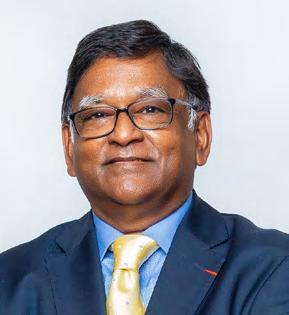
7 Fresh start for German-African relations Introduction Position | Africa policy | Continent of opportunities
4 Germany Trade and Invest (2021)
Marday Venkatasamy
Annual GDP growth in Sub-Saharan Africa and the world
(2000-2021) in percent
Key challenges for German companies in Africa
Source: Federation of German Industries: Entrepreneur survey “German entrepreneurial engagement in Africa 2022”. 2022
8 Position | Africa policy | Continent of opportunities Introduction Fresh start for German-African relations Sub-Saharan Africa Word 8 6 4 2 0 2 -4 2000 2001 2002 2003 2004 2005 2006 2007 2008 2009 2010 2011 2012 2013 2014 2015 2016 2017 2018 2019 2020 2021 Corruption 65 % Political instability 62 % International competition 57 % Bureaucratic hurdles 54 % Lack of infrastructure 51 % Reliability of local partners 51 % Shortage of qualified specialists 43 % Market size too small 35 % Non-transparent calls for tenders 32 % Regulatory barriers 30 % Other 24 % Entrepreneur Survey
Source: BMVI (2020b, 2020c).
Will the company’s own commitment in Africa be intensified in the future?
Entrepreneur survey
Source: Federation of German Industries: Entrepreneur survey “German entrepreneurial engagement in Africa 2022”. 2022

German direct investment abroad
In US€ million (receivables from direct investment relationships), in 2020
Source: Deutsche Bundesbank: Direct investment statistics. 05/16/2022
9 Fresh start for German-African relations Introduction Position | Africa policy | Continent of opportunities Expanding our own commitment in Africa Yes 70 % 19 % 11% No Maybe EU countries North America Europe Asia Central and South America Near / Middle East and North Africa Sub-Saharan Africa 1,150,008 330,302 182,654 169,756 44,623 13,268 6,774 (Without Near
Middle
(Without EU countries)
/
East)
Support the implementation of the African Continental Free Trade Area
The Pan-African Free Trade Area has the potential to become the key to the continent’s development. On the one hand, its implementation will increase intra-African trade, and on the other hand, the continent is also becoming an attractive investment location for international companies due to the enlarged markets.
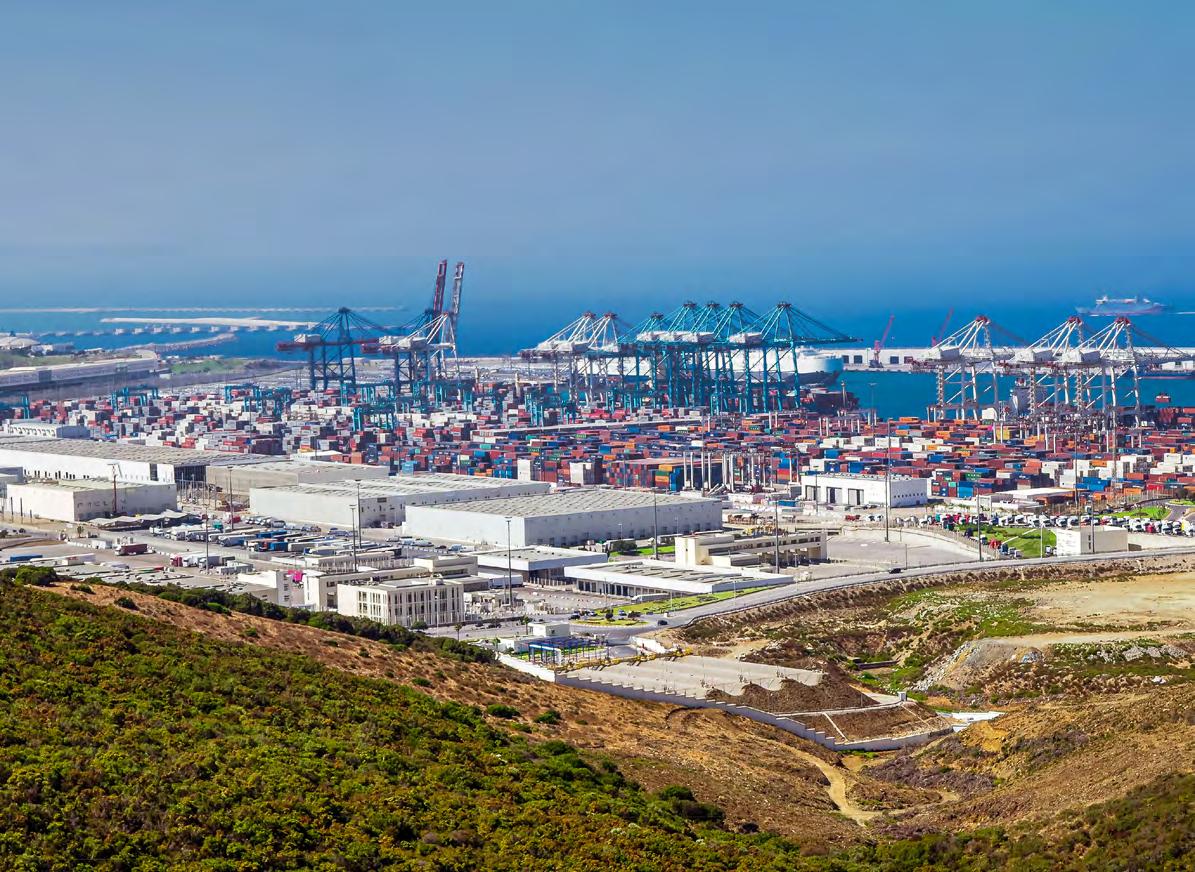
The African Continental Free Trade Area (AfCFTA) came into force on January 1, 2021. It comprises 54 countries with a total of 1.3 billion people, making it one of the largest free trade areas in the world. In the coming years, tariff barriers to trade are to be successively reduced until fully eliminated.5 The World Bank estimates that this will sustainably combat poverty and increase the continent’s income by US$450 billion annually.6
To date, high tariffs on the African continent have led to fragmented markets, which in turn has resulted in low product diversity. With average tariffs of 6.1 percent, companies currently have to pay more for exports within Africa than for exports outside the continent. 7
5 Cf. AfCFTA (2022)
6 Cf. World Bank (2022)
7 Cf. AfCFTA (2022)
By eliminating these costs, African companies can open new markets and reduce production costs by exploiting economies of scale. In return, African consumers receive access to a broader range of products thanks to a free movement of goods.
In addition, larger markets and free movement of capital increase the attractiveness for local and foreign investors. Regional economic integration is also of great importance for German industry, as the free trade area opens new sales markets. Thus, more than any other factor, the AfCFTA has the potential to make the African continent a more attractive investment destination for German companies. If successfully implemented, the agreement will liberalise a large part of Africa’s trade in goods and services, electronic commerce and investment, and create common rules in areas such as intellectual property and competition policy. This will significantly improve conditions for regional and
10 Steuerpolitische Einordnung und Bewertung des Optionsmodells aus Sicht der Wirtschaft
01
interregional value chains. The manufacturing industry in Africa could benefit from cutting-edge technologies developed by German companies.
Despite the enormous benefits, some African countries are still hesitant to the extent of some countries having signed the agreement without ratifying it. There is too much concern that the local economy would suffer from competition with imports and that jobs would be lost. For this reason, the African Union (AU) has created a compensation fund as part of the free trade agreement. This fund is intended to provide technical advice to African countries and the private sector and help them prepare for growing competitive pressure. This is an important instrument for securing the political will to implement the free trade area in the long term.
Recommendations for action
. The BDI recognizes the great economic potential the agreement is expected to have on the African continent. The German government should therefore continue to support African countries and the AU in implementing the AfCFTA. The long-term goal should be to create a free trade area between the EU and Africa.
. In order for the agreement to be swiftly implemented, deficits within the administrative environment must be reduced. To this end, resources must be made available to train and recruit administrative staff.
. The BDI recommends that African countries grant the AU far-reaching rights to enforce free trade. This is the only way to prevent the reintroduction of tariffs and other non-tariff trade barriers in the long run.
. A free trade area implies a tightly meshed network of roads, railways, ports and airports. The BDI therefore recommends that African countries invest in infrastructure and maintain it (see chapter 6). The BDI recommends that the German government uses its development policy to strengthen regional infrastructure and hence laying the foundations for a successful free trade area.

Position | Africa policy | Continent of opportunities 11 Fresh start for German-African relations
Support the implementation of the African Continental Free Trade Area Forecast on the economic impact of the Pan-African Free Trade Area Source: AFCFTA: Creating One African Market. Accessed 23.08.2023
Members of the African Union have signed the agreement on the Pan-African Free Trade Area.
could be added to African national income (7% increase). of intra-African
the AfCFTA
increase the size of
54 43 1.3 30 billion people million people 450 billion US dollars 29 trillion US dollars By an estimated 52 percent percent About 6.1 An average tariff of
Signatories have ratified the agreement. will be directly affected by the AfCFTA. can potentially be lifted out of extreme poverty through the AfCFTA.
trade
could be increased by the abolition of customs duties. This could even double if non-tariff barriers were also removed.
Companies
are currently subject to exports within Africa face higher tariffs than on exports to other continents.
can
the African economy.
Use green hydrogen for win-win partnerships
Green hydrogen is the key technology for phasing out fossil energy sources. To meet the demand, Germany will have to rely on imports in the future. African countries are the ideal partner for this due to their high potential to produce renewable energies.
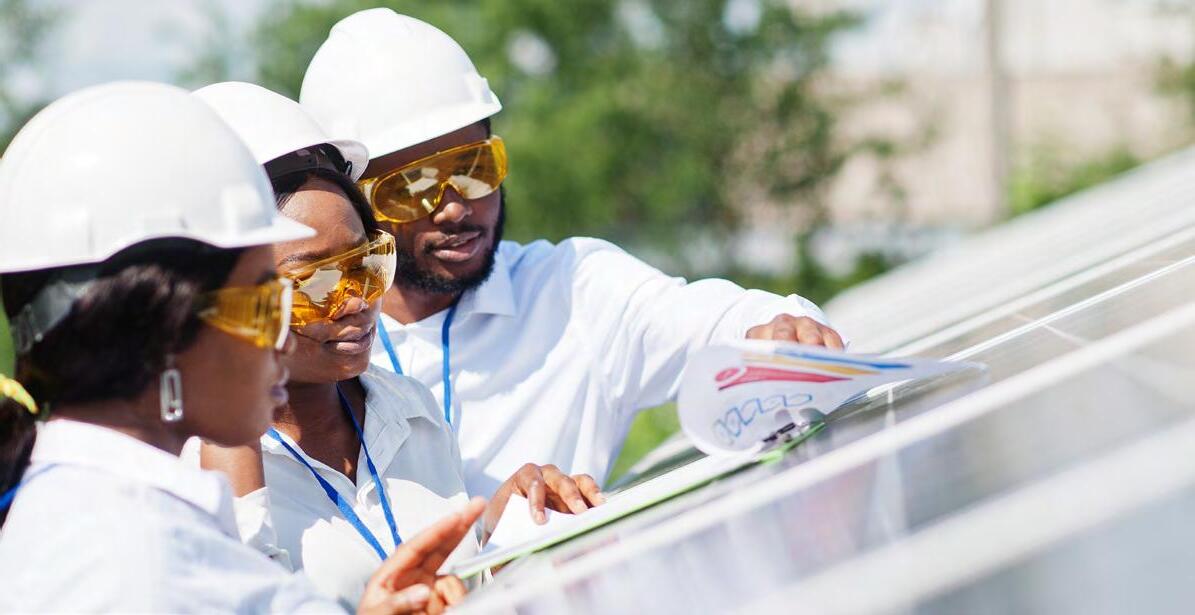
The global energy transition is a key social challenge of our time. The switch to emission-free production processes requires enormous efforts from the economy worldwide. As the energy source of the future, green hydrogen is to be used primarily wherever electrification is technically impossible or uneconomical. This includes the areas of transportation, shipping, aviation and heavy-duty traffic. The steel industry, the glass industry and cement production are also among those industrial sectors that can use green hydrogen to convert energy-intensive manufacturing processes based on fossil fuels in a climate-neutral manner. In the long term, it is also conceivable that hydrogen will be used by individual transport as an alternative to battery-based electrification by means of fuel cells, or as a substitute for fossil fuels in heat production, for example in private households.
German companies are leaders in many areas of hydrogen technology. Their innovative strength and global presence offer the potential for an outstanding contribution to zero-emission hydrogen. With the National Hydrogen Strategy, Germany has committed itself politically to the hydrogen economy as a future key technology in the energy sector. The aim of the strategy is to achieve an electrolysis capacity of five gigawatts for green hydrogen in Germany by 2030.8 However, this can only meet domestic demand partially.
Another reason to take a closer look at Africa. The African continent has a considerable locational advantage over Europe when it comes to the production of hydrogen: It is particularly well suited for hydrogen production due to its proximity to the equator and the associated higher intensity and average duration of solar 8 Cf. Die Bundesregierung (2020)
12
02
radiation, especially for producing renewable energies. For African countries, the associated high levels of government and private investment offer the opportunity to use green hydrogen for their own industrialisation, create skilled local jobs and meet the growing local demand for energy sources. Some countries, such as South Africa, have already presented their own plans for a hydrogen economy. This is a good baseline for African-German win-win partnerships at eye level.
Hydrogen partnerships with African countries are currently in the early stages. In order to make future production of green hydrogen in Sub-Saharan Africa both efficient and successful for all partners, the German Federal Ministry of Education and Research (BMBF) is funding feasibility studies. Findings obtained with the help of these studies enable the selection of partner countries for pilot projects. However, technical, political, and social obstacles in Germany and Africa must be overcome if German demand for hydrogen is to be met by imports from Africa.
A suitable infrastructure is needed to export green hydrogen. Various methods of transporting hydrogen as a pure gas or bound to other molecules by ship or pipeline are currently being tested. The economic viability and technical feasibility of the individual processes are key factors in deciding which mode of transport to use in the future.
Transporting hydrogen by pipeline requires a corresponding infrastructure. So far, no such infrastructure exists in Sub-Saharan Africa. Pipelines also mean a fixed geographic link to specific production sites. Suppliers and customers are bound to each other by longterm contracts. Transport by ship, on the other hand, is more flexible and requires less infrastructure investment. However, their needs for production sites to be located within the immediate vicinity of a port. The more long-term the hydrogen cooperation with African partner countries is, the more attractive it is to expand the hydrogen pipelines. Initially, those mean high fixed expenses, whilst at the same time being associated with lower operating costs.
Economic and political stability in the African partner countries is indispensable for attracting German players to long-term investment projects. Improving the general framework for private-sector activity on the ground therefore remains one of the most important
decision-making factors for or against increased economic involvement by German companies in Africa. Only reliable surrounding conditions allow to credibly consider costs and risks of investments in hydrogen production plants and the associated infrastructure.

In the future, large numbers of well-trained specialists will be needed along the hydrogen value chain for installation, maintenance, production, and transport. Electrolysers and plants for hydrogen derivatives and fuel cell production require highly specialized technicians. Many North African countries already have expertise in natural gas production and are able to transfer this to large parts of hydrogen production. In the countries south of the Sahara, this expertise still needs to be built up, for example by promoting knowledge exchange between industrialised and developing countries.
Broad acceptance by the local population is necessary for the success of hydrogen partnerships. Past experience has shown that entering dialogue at an early stage, based on a partnership of equals, is crucial for successful cooperation. Acceptance of the local population is increased, among other things, by the fact that hydrogen production builds on existing value chains. At the same time, African countries themselves can benefit from the technologies and production facilities and use the fuel for their own industrialisation.
Position | Africa policy | Continent of opportunities 13 Fresh start for German-African relations Use green hydrogen for win-win partnerships
Recommendations for action
. The BDI welcomes the efforts of the German government to promote the establishment of German-African green hydrogen partnerships.
. The BDI expects the African governments to make efforts for creating an investment-friendly climate. From German industry’s point of view, these particularly include legal certainty and political stability.
. The BDI encourages African governments to invest in a well-developed physical infrastructure for hydrogen production and transport, including roads, ports, water and electricity.
. The BDI recommends that African governments and the German federal government train and upskill specialists for the production of green hydrogen. Only with the help of well-trained African experts and managers, the energy transformation can be managed in a participatory manner.
When the energy transition is discussed, the term “green” hydrogen is often mentioned as a climatefriendly alternative to fossil fuels.
Hydrogen does not exist in free state and must be created artificially by hydrolysis (splitting of chemical compounds by reaction with water) with the help of other energy carriers. The most important element in the use of hydrogen is the fuel cell. It converts the energy contained in the water into heat and electricity.
Hydrogen is a colourless gas. The “colour” of its name depends on the primary energy used for production. If coal gases or methane gases are used for production, we speak of “black” or “grey” hydrogen. If methane gas is used and the resulting CO2 is bound and thus does not enter the atmosphere, it is “blue” hydrogen.
The most climate-friendly variant is the “green” hydrogen. It is produced by the electrolysis of water. Here, renewable energy is used, so green hydrogen is CO2-neutral.
14 Position | Africa policy | Continent of opportunities Fresh start for German-African relations
Use green hydrogen for win-win partnerships
Africa has the world’s greatest potential for solar power production
Average long-term potential solar power generation by world region (in kWh / kWp / per year)
/ South America and the Caribbean
Statista: Africa leads the world in solar power potential. 5 September 2022
Estimated onshore renewable energy potential in Africa from 2020, by energy source (in terawatt hours per year)
Source: Statista: Estimated theoretical onshore renewable energy potential in Africa as of 2020, by source. März 2022
15 Fresh start for German-African relations Use green hydrogen for win-win partnerships Position | Africa policy | Continent of opportunities
Solar energy Wind energy Biomass Hydropower 1,449,742 978,066 2,374 1,478 105 Geothermal energy
0 500 1000 1500 2000 Africa Central
North America Asia Oceania Europe & Russia 1,646 1,635 1,595 1,580 1,511 1,256
Establish sustainable raw material cooperations
German companies are dependent on diversifying their sources of raw materials. The German government should explore closer cooperation with African countries to promote sustainable local exploration and refining while securing potential raw material access.
Commodities are the backbone of many African economies. Export earnings of countries such as Guinea 9 , South Africa10 or the Democratic Republic of Congo11 are largely generated by commodity exports. The EU lists several critical raw materials whose largest reserves are located in Sub-Saharan Africa. The use of many of these resources in electric vehicles and catalytic converters, such as cobalt or platinum group metals, makes it necessary for the energy transition to secure imports adequately. To increase independence from individual carriers, energy exports such as oil, gas and liquefied natural gas (LNG) from African countries will become more important for Europe in the future. The responsible extraction of raw materials could lead to sustainable
9 Cf. Germany Trade & Invest (2022a)
10 Cf. Germany Trade & Invest (2022b)
11 Cf. Germany Trade & Invest (2022c)
development in the respective countries and contribute to a win-win partnership between Africa and Europe.
In Africa, German companies are primarily represented in the extraction and storage of raw materials. In addition, institutions such as the Federal Institute for Geosciences (BGR) and the German Mineral Resources Agency (DERA) make an important contribution to securing supplies through studies and cooperation. Technical know-how, machinery and equipment are important export goods of German companies in the mining services sector.

The field of internationally operating raw materials companies is not very diversified. A large part of further processing of African resources such as bauxite or cobalt takes place in China.12 For example, Guinea is
12 Cf. Bundesverband der Deutschen Industrie (2022)
16
03
the largest producer of bauxite, but processing it into aluminium takes place almost exclusively in China. The same applies to metals of the platinum group. Improved direct sourcing from Sub-Saharan Africa would reduce dependence on Chinese processing and diversify value chains. Diversification can thus contribute to sustainable security of critical raw materials. To achieve this goal, policymakers must advocate non-discriminatory access to resources. At the same time, investments must be made in Europe to expand capacities for further processing raw materials.
Africa is also becoming a focus of attention due to the energy crisis in Europe, resulting from the Russian war of aggression on Ukraine. The gas sector offers opportunities for energy and raw material partnerships. Countries such as Senegal and Nigeria have got large gas reserves and could therefore contribute to replacing Russian gas in the medium term. As of autumn 2023, Senegal plans to export liquefied natural gas, also to Germany.
Longer and more complex value chains go hand in hand with a loss of transparency in the extraction and processing of raw materials. Compliance with environmental and social standards and cases of child labour or human rights violations become difficult to trace. Nevertheless, for German industry, the responsible extraction of raw materials and the question of human rights are important issues. Many companies are involved in industryand multi-stakeholder initiatives and have established risk management systems to identify and prevent human rights risks within their sphere of influence and to take remedial action in specific cases.
Transparent financial flows in producing countries are important for sustainable raw material extraction, too. The German extractive industry is therefore actively involved in the implementation of the voluntary initiative for more transparency in the extractive sector, the Extractive Industries Transparency Initiative (EITI). EITI sets standards for financial transparency and government accountability.
Recommendations for action
. The BDI supports the German federal government’s efforts to reassess its relations with Africa, especially in the raw materials sector, in light of the new geopolitical circumstances and underpin them with specific measures.
. The BDI recommends that the German federal government gives greater weight to the factor of security of supply within the instrument of guarantees for untied financial credits (UFK). An additional risk capital instrument can help to strengthen direct procurement from mines and thus diversify sources of supply.

. The BDI is expressly in favour of the diversification of German companies’ value chains. To this end, the entrepreneurial activities of small and medium-sized enterprises (SMEs) in particular must be strengthened in African markets by identifying market opportunities for German industry in direct or indirect vicinity of raw materials projects and by defining the need for technologies, infrastructure, services and training.
. The responsibility for ensuring compliance with human rights, ecological and social standards must not be delegated solely to German companies. The BDI calls on the German government to link development cooperation more closely with specific projects in the extraction of raw materials. Regulations on corporate due diligence within the supply chain should take into account the need to safeguard critical raw materials.
. The BDI explicitly supports international transparency initiatives such as the EITI. Speaking for the private sector, the BDI is involved in the German multi-stakeholder initiative D-EITI for transparency within the German raw materials sector. Furthermore, German industry is committed to compliance with existing international standards, such as the UN Guiding Principles on Business and Human Rights, the OECD Guidelines for Multinational Enterprises and the UN Global Compact.
17 Fresh start for German-African relations Establish sustainable raw material cooperations Position | Africa policy | Continent of opportunities
Supply Chain Due Diligence Act (LkSG)
The LkSG was passed by the German Bundestag on June 11, 2021, and has come into force on January 1, 2023. It is intended to improve the international human rights situation by imposing due diligence obligations on companies operating internationally and defining responsible management for supply chains. According to §3 LkSG para. 1 sentence 2, the statutory due diligence obligations include the establishment of a risk management system, the performance of regular risk analyses, the development of remedial measures and the establishment of a complaints procedure. From 2023, this law will apply to companies with at least 3,000 employees, and from 2024 to companies with at least 1,000 employees.
Initiative to improve transparency in the raw materials industry (Extractive Industries Transparency Initiative, EITI)
The voluntary, Oslo-based multi-stakeholder initiative, which brings together governments, private companies, and civil society organisations, was launched in 2003. The aim of this initiative is to increase transparency of money flows in the context of raw material extraction. The payments made by companies for licenses, taxes, etc. in connection with the extraction of raw materials are compared with the stated revenues of the state and, together with the use of those revenues, are made transparent and public. In addition to European countries (including Germany), the initiative also includes African countries such as the Democratic Republic of Congo, Senegal, and Guinea.
Commodity funds
Revenues from the raw materials sector flow into commodity funds, which are used for sustainable economic development. This is intended to reduce the countries’ dependence on the export of the respective raw materials. Norway’s commodity fund is a model here. Botswana has also set up a stabilisation fund similar to the Norwegian one. For example, Botswana has invested a large part of diamond proceeds in infrastructure, education and the fight against poverty, from which its entire population benefits.
UN Guiding Principles for Responsible Corporate Governance
The Guiding Principles on Business and Human Rights were adopted by the UN Human Rights Council in 2011. They represent a global instrument against human rights violations in the business context. According to the 31 published principles, companies have a duty to respect human rights (“Responsibility to Respect”) and to create grievance mechanisms (“Remedy”). However, the duty to protect human rights (“Responsibility to Protect”) and to provide access to effective remedies is clearly assigned to the state.
UN Global Compact
The UN Global Compact, founded in 1999 by UN Secretary-General Kofi Annan, is a network in the form of a worldwide agreement between companies and the United Nations to make globalization more socially and ecologically responsible. The ten basic principles call on all participating companies to increase their commitment to core values in the area of human rights, labour rights and environmental standards in their worldwide activities. Since its inception, more than 15,000 companies from 158 countries have joined the initiative.
18 Position | Africa policy | Continent of opportunities Establish sustainable raw material cooperations Fresh start for German-African relations
German direct imports of (selected) raw materials from Sub-Saharan Africa
From the year 2021
bauxite 90. 8 %
(ores and concentrates) chromium 74.1 %
platinum 21. 2 %
rhodium 14.7 %
17.3 %
Guinea
South Africa
graphite
Mozambique
Source: Federation of German Industries: Analysis of existing dependencies and recommendations for action. 2022
Position | Africa policy | Continent of opportunities 19 Fresh start for German-African relations Establish sustainable raw material cooperations
Use future technologies
The use of new technologies is also a gamechanger for society and economy in Africa. Internet from space creates the possibility to connect remote regions globally. Satellite data provide an important and objective basis for effective and tailored environmental protection measures and for efficient and resource-conserving agriculture.
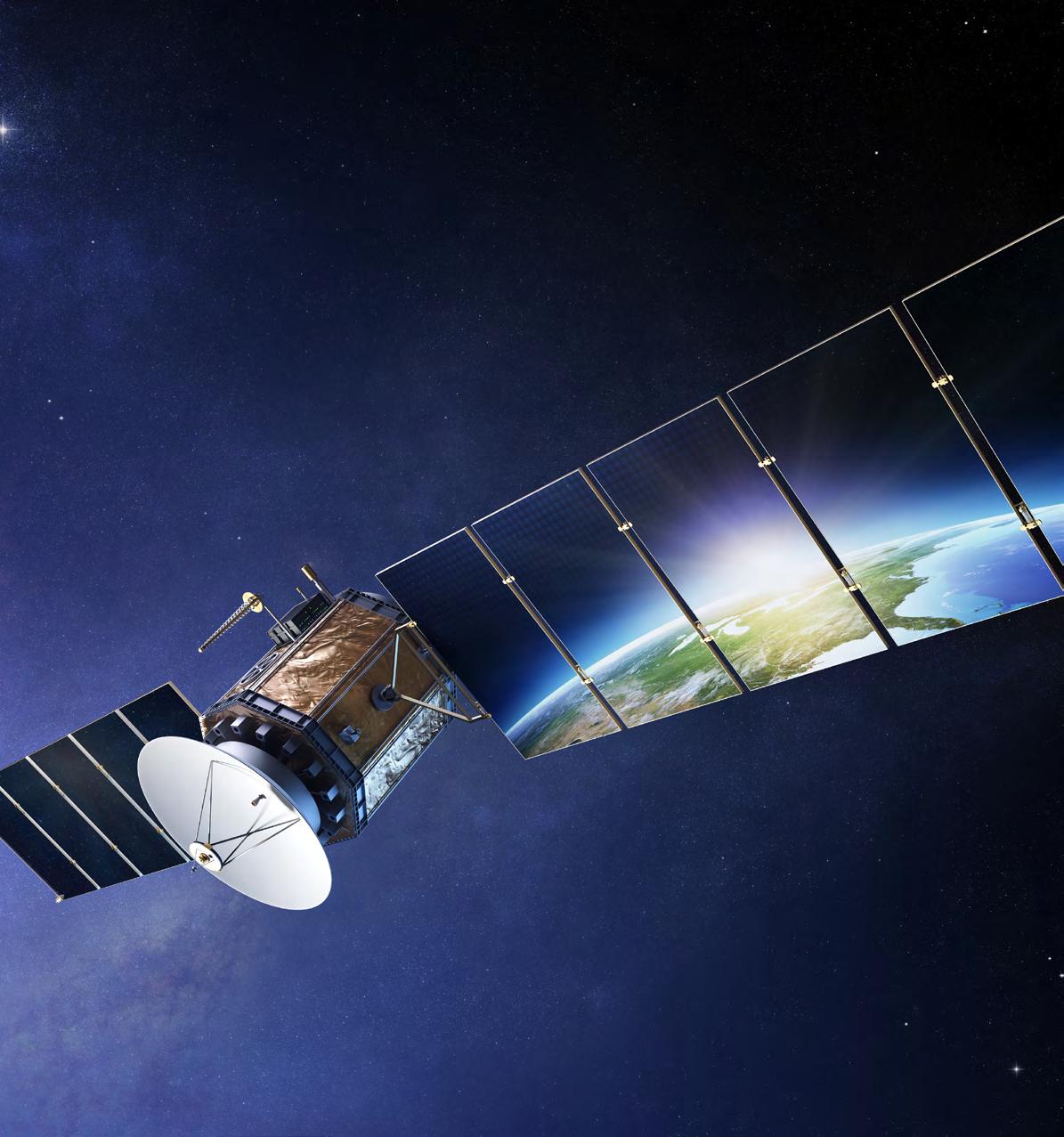
04
The number of Africans who use the Internet on a daily basis is gradually increasing.13 Innovative trends can be observed, particularly in the use of cell phones. For example, mobile payment services made in Kenya or newspapers that can be read and shared via WhatsApp, such as “The Continent,” are an integral part of mobile data use. At the same time, when it comes to digitalisation, Sub-Saharan Africa lags behind developments in other regions of the world. Internet access is still distributed very unevenly: Almost 300 million people live more than 50 km away from a fibre-optic or cable connection, and only about 28 percent of the population in Sub-Saharan Africa uses mobile Internet.14 This inadequate digital infrastructure prevents large parts of the population from participating in social and economic processes.
In addition to the expansion of broadband connections, geological data acquisition is also becoming increasingly important. No continent is as affected by the consequences of the climate crisis as Africa. In addition to geographic conditions, the large agricultural share of gross domestic product makes African economies particularly susceptible to weather upheavals, droughts and other environmental catastrophes.15 This is already having a dramatic impact on local economies, leading to crop failures and correspondingly high income losses.
Collecting, processing and evaluating data and information on atmosphere, air and water quality, or on the condition of soils and plants is crucial to ensuring the efficient use of resources. Effective climate and environmental measures also heavily rely on reliable data. Whether African countries will be able to better mitigate the consequences of the climate catastrophe in the future depends to a large extent on the more intensive use of new technologies.
In the future, satellites from space will be able to provide a stable Internet even in remote regions of Africa, making them a true game changer. Whether it is broader Internet connectivity or the development of a data-based climate policy, new types of satellite technologies are increasingly coming to the fore. Networking is the basis for economic participation and prosperity. Satellite data
13 Cf. Statista (2022a)
14 Cf. GSMA (2021)
15 Cf. African Development Bank Group (2022)
can also be used in agriculture to apply seeds, fertilisers and water to the fields with centime accuracy. Agricultural machinery can thus be controlled much more efficiently. Also, satellite data are the basis for early disaster management: They reduce risks related to climate effects and enable rapid responses to natural disasters through situational real-time monitoring and immediate data provision for authorities, relief workers and those affected.
African companies are also becoming increasingly important in the digitisation of Sub-Saharan Africa. The COVID-19 pandemic has accelerated the process of digital transformation in Africa and led to several spin-offs of African start-ups in the technology sector. Especially in space, developments in the African market are enormous: Many countries have already developed their own space strategies. By 2024, an estimated 20 African countries plan to launch their first satellites, including Côte d’Ivoire, Mauritius, Uganda and Zimbabwe.16 In addition to government programs, an increasing number of private African companies are also operating in the new space sector.
16 Cf. Business Insider South African (2021)
Position | Africa policy | Continent of opportunities 21 Fresh start for German-African relations Use future technologies
Recommendations for action
. Tech companies from Sub-Saharan Africa can become the continent’s growth engine. They have the potential to close the digitisation gap between Sub-Saharan Africa and the other regions of the world. The BDI recommends that the African governments protect the (intellectual) property rights of these companies more effectively through patent laws. This is the only way to ensure that innovative activities by companies operating in Africa are rewarded.
. The European Union (EU) is planning to set up a satellite constellation for secure connectivity and Internet from space (Union Secure Connectivity Program). The German government should work to ensure that the constellation also covers Africa, thus making fast Internet available at every location on our neighbouring continent.
. The EU’s Global Gateway Initiative also includes an agenda item on secure satellite communications. It aims to improve Internet connectivity of the African continent, especially in remote areas and regions. The German government should work to ensure that this goal is implemented swiftly so that Africa’s digital connectivity can be achieved in a timely manner.
. African and German tech companies are benefiting from exchanging ideas and know-how. The BDI recommends that the German government promotes cooperation between German and African companies by ways of its development cooperation. Especially in earth observation, this exchange is elementary for the efficient achievement of social and political sustainability goals.
22 Position | Africa policy | Continent of opportunities Use future technologies Fresh start for German-African relations
Source: Business
be a significant
in the new space age - here’s why. 19. September 2021 are expected to launch By 2024 110 20 African countries satellites
Africa’s Path to Space.
Insider South Africa. Africa is poised to
player
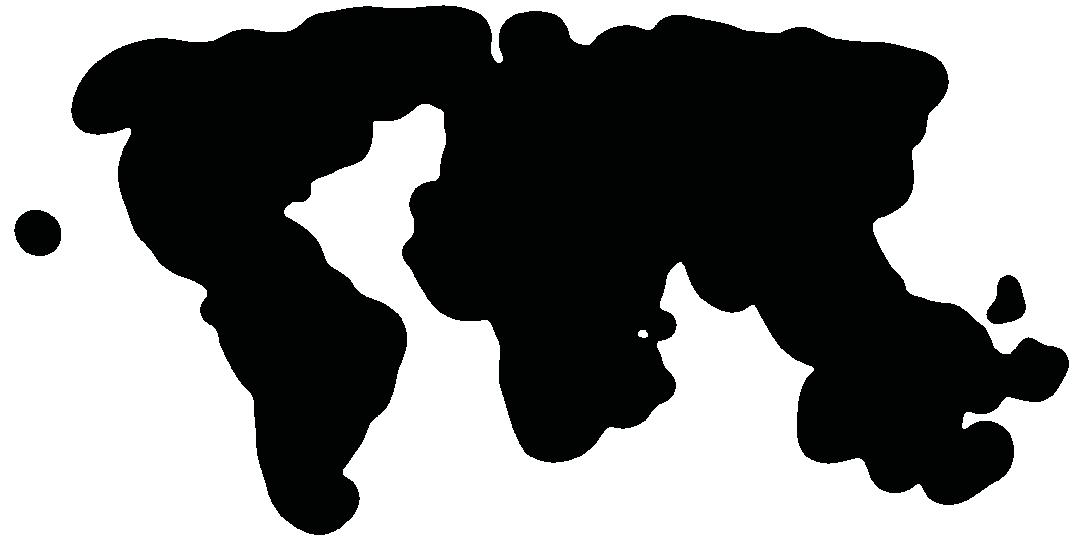
23 Fresh start for German-African relations Use future technologies Position | Africa policy | Continent of opportunities
Worldwide data transmission rate in megabits per second (Mbps)
200-300 Mbps 100-200 Mbps 50-100 Mbps 20-50 Mbps 0-10 Mbps
Source: Cable UK: Worldwide broadband speed league 2022. 06 September 2022
Dovetail development cooperation and foreign trade promotion
Compared with other OECD and non-OECD members, German companies are losing out on the international competition for orders. Therefore, an intelligent dovetailing of development cooperation and foreign trade promotion is urgently needed.

24
05
A sustainable, development-oriented partnership with Africa requires serious dovetailing of foreign trade and development policy. Improved coordination between the instruments of foreign trade promotion and development policy creates added value for German economy, for example by diversifying supply chains and opening up new sales markets for German companies. At the same time, partner countries in Africa are benefiting, for example by creating jobs and expanding infrastructure (see chapter 6). The existing separation between development cooperation and foreign trade promotion must be overcome. In addition, the Federal Foreign Office can accompany companies on the ground and provide support for business initiations.
Some of the German government’s initiatives, such as “Compact with Africa” and the Africa Business Network, are steps in the right direction. Other projects, such as the Supply Chain Sourcing Obligations Act (LkSG), which has come into force on January 1, 2023, harbour the risk that African suppliers from high-risk countries will be shunned.17 This could also have a negative impact on economic development in Sub-Saharan Africa.
Efforts to dovetail foreign trade promotion and development policy have increased in various OECD countries. In member countries such as Denmark, the United Kingdom and the United States, improved dovetailing is already being practiced and more use is being made of business involvement in development cooperation. Compared to other OECD countries, German companies benefit to a much lesser extent from government-funded programs and projects in German development cooperation. While – according to an OECD study - more than 75 percent of the volume of national development cooperation is awarded to domestic companies in Austria and France, this share is just 25 percent in Germany.18
In recent years, German government has focused on investment and export credit guarantees for Africa. In 2021, German government issued investment guarantees amounting to 2.6 billion euros for projects in eleven countries. The majority of guarantees (50 percent) went to projects in Asia and 37 percent to projects in Africa
(Egypt, Kenya, Nigeria, South Africa and Tunisia).19
In the area of export credit guarantees, the federal government has provided cover for supplies and services to Africa to the amount of 1.6 billion euros (2020: 1.2 billion euros).20 The federal government has created selective incentives for export credit guarantees for exports to Africa. However, German exporters often lose out in international comparison because they cannot compete with Asian financing conditions.
German industry is part of the solution to global challenges, but it needs a functional and practical toolbox with Hermes guarantees and, in addition, a European financing facility. China, as a non-OECD member, as well as other actors within the OECD have already come further in this regard by bundling various funding instruments.
If German economy continues to fall behind its international competitors, it will lose value-added power at home as well as market share in Germany. Therefore, we need a joint effort to find innovative, modern, and flexible solutions that provide targeted support for German exporters.
Position | Africa policy | Continent of opportunities 25 Fresh start for German-African relations Dovetail development cooperation and foreign trade promotion
17 Cf. German Institute for Global and Area Studies (2022)
18 Cf. OECD (2022)
19 Cf. Bundesministerium für Wirtschaft und Klimaschutz (2021)
20 Cf. Ibidem
Mary Ngechu
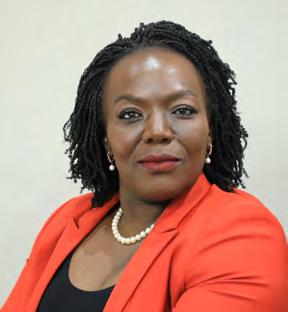
African and German governments should support us by creating the right framework conditions as well as funding instruments.”
Recommendations for action
. The German government should increase its commitment to development assistance, especially for infrastructure projects in Africa, and tie their financial support on an appropriate share of both German and local added value. Regarding Africa, the instruments of foreign trade promotion for the Sub-Saharan regions should be strengthened.
. The BDI calls on the German government to change the paradigm from donations (soft loans) to “quality aid” as quickly as possible.
. The German government must continue to press ahead assertively the reform of the OECD Consensus.
. The federal government should work to strengthen the competitiveness of the EU, using its financial strength to finance large-scale infrastructural projects by establishing a well-capitalised EU financing institution. Such a financing institution should have a mandate to combine European development loans with export financing and export guarantees from EU member states to structure attractive financing packages, similarly to those of Asian and U.S. financing institutions.
. Aiming for a sustainable development policy, it is essential to ensure fair and quality-oriented competition in the tendering process for financial cooperation projects. Sustainable tendering procedures must be agreed on as binding.
. The BDI calls for a regular review to simplify visa issues by the German government. Furthermore, the German business community advocates for visa facilitation for African business people, e.g. by issuing one-year and multi-year visas.
. Contracts in the context of international cooperation must be designed in such a way that risks for companies are kept to a minimum. Tenders and contracting should clearly define tax frameworks for projects in advance. There should also be fallback clauses for the event that local contractor structures fail (see suspension of cooperation with Afghanistan).
26 Position | Africa policy | Continent of opportunities Fresh start for German-African relations Dovetail development cooperation and foreign trade promotion
“African manufacturers are strong partners for German companies. The
CEO of Line Plast Group of Companies and Member of the Board of Directors
East African Business Council
Expand infrastructure
German companies can contribute to close the huge gap in infrastructure supply in Africa. To this end, the EU’s Global Gateway Initiative should be implemented quickly and in a business-friendly manner.
To date, many African countries have a significant infrastructure deficit, especially regarding energy supply and transportation (road, rail, air- and sea traffic). In 2020, around 600 million people in Sub-Saharan Africa had no access to power supplies.21 Rural areas in particular are lacking paved road networks for a smooth movement of goods and people. Many regions of Sub-Saharan Africa are lacking access to clean drinking water. Use of the Internet and mobile communications has increased significantly over the years, but it still lags behind the global level. Rapid population growth is further increasing the demand for a well-developed infrastructure.22
Infrastructural deficits and inadequate power supply are two of the main obstacles for companies considering to invest in African markets. Modern infrastructure networks, on the other hand, can increase the competitiveness of the manufacturing sector quickly and cost-effectively by delivering raw materials to producers and manufactured goods to consumers. International transport systems will be critical to the practical implementation of the Pan-African Free Trade Area (see Chapter 2). A solid telecommunications network will link the countries of the continent and ensure a fast data flow. Continuous innovations within the mobile payment market highlight the positive effects of the economic impact modern information technologies are already having on Africa.23 Reliable and sustainable power supplies will be just as important. They ensure unhindered production, influencing internationally operating companies when considering new locations.
The African Development Bank estimates that investments of up to US$170 billion per year are needed for infrastructure development in Africa.24 Here, German industry can make an important contribution. Due to the quality of their projects and the responsible use of resources, German construction companies enjoy an excellent reputation worldwide. Also, they are valued employers in Africa. They invest in their employees, in education and training, and they can make an important contribution to sustainable development with their technology and know-how. Nevertheless, they are underrepresented on the African market. To date, the German construction industry has generated only a small share of its foreign sales in Sub-Saharan Africa. 25 This is also due to the generous loans granted by China and other Asian countries to African countries within the infrastructure sector, under the condition of delivering to their own companies. As a result, Chinese companies are dominating the African infrastructure market.26
In response to China’s infrastructure projects, the EU announced the Europe-Africa Global Gateway Initiative in 2021, which is intended to promote sustainable infrastructure with an investment volume of up to 150 billion euros.27 The Gateway Initiative also calls for fair public procurement legislation, more closely aligned with the business and implementation capabilities of European companies for the realisation of infrastructure projects. To this end, there is an urgent need to improve both the speed of introduction/implementation and the volume.
21 Cf. McKinsey (2020)
22 Cf. The Economist (2020)
23
24 Cf. African Development Bank (2018)
25 Cf. Hauptverband der Deutschen Bauindustrie (2020)
26 Ibidem
27 Cf. Deutsche Welle (2022)
27 06
Offered by telecommunications companies and supported by a network of licensed agents, mobile money services allow registered users to deposit cash into a virtual wallet and use that money for payments and purchases, including peer-to-peer (P2P) payments. According to Statista, in 2021 mobile money transactions had a volume of 700 billion US dollars.
Sabine Dall’Omo
“One of the key opportunities for German companies on the African continent is the expansion of the infrastructure. One example of this is the development of decentralised energy systems based on renewable energies. This is the only way to ensure a secure energy supply for all people in Africa. German companies can make a significant contribution with their technology and know-how. Together with our African partners, we are creating solutions to turn the continent’s challenges into development opportunities.”
Recommendations for action
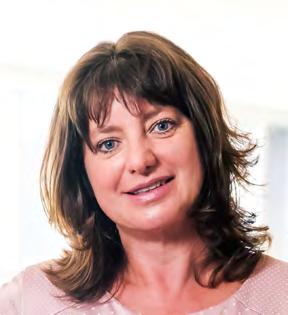
. The BDI recommends that the German federal government should prioritise areas of technical and social infrastructure (such as transport infrastructure, energy supply through renewable energies, health systems and education) in their development cooperation involving German companies. This should be achieved by increased financial support for infrastructure projects by Kreditanstalt für Wiederaufbau.
. In the next few years, both population - and economic growth will drastically increase demand for electricity in Sub-Saharan Africa. The BDI recommends that the German government intensify its efforts for hydrogen cooperation with the countries of Sub-Saharan Africa (see chapter 1). This can advance energy diversification in Germany and at the same time meet increased energy consumption in Africa.
. Due to the pronounced infrastructure deficit in Africa, clearly more investment in transport infrastructure is needed. The BDI recommends that, considering the sizeable costs to be expected, African countries increasingly involve local and foreign private sectors when searching for viable approaches to infrastructure development and financing. Reliable legal frameworks and legal certainty should thus create better conditions for public-private partnerships (PPPs).
28 Position | Africa policy | Continent of opportunities Expand infrastructure Fresh start for German-African relations
CEO, Siemens Southern and Eastern Africa
Share of households with access to electricity in percent
29 Fresh start for German-African relations Expand infrastructure Position | Africa policy | Continent of opportunities
Source: McKinsey
Create opportunities through education
Africa has a shortage of skilled workers. At the same time, almost half of all Africans are under 18 and will need jobs in the future. German companies are already investing heavily in training and development of their employees on the continent. With the support of the German government, they could expand this commitment even further.
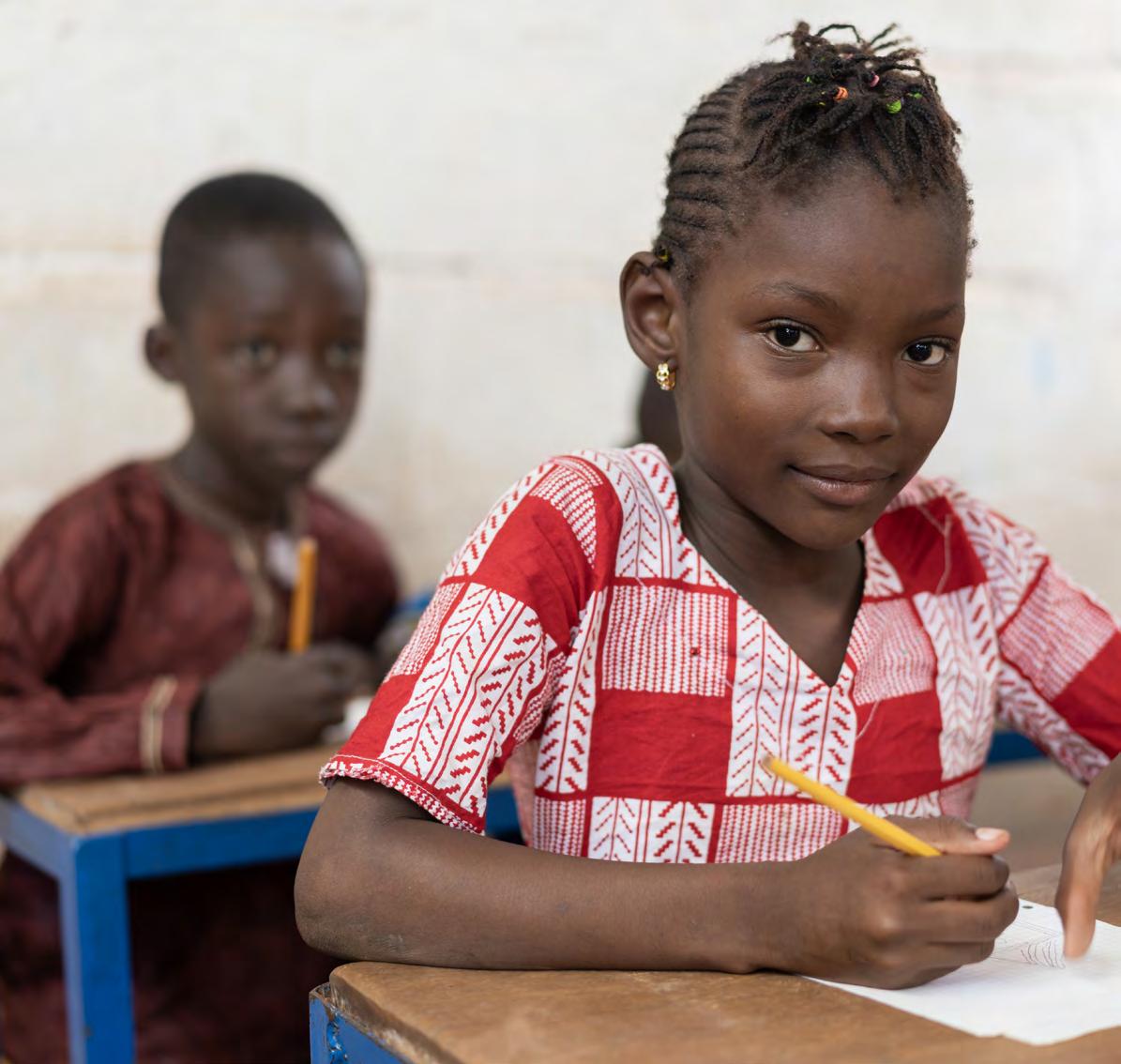
30
07
More than 46 percent of Africans are underage. 28 Nowhere in the world the proportion of young people is bigger than in Sub-Saharan Africa.29 As a result, a disproportionately large number of people of working age will be available to the labour market in the future. To use the full potential of this demographic structure, there must be increased investment in education and training of skilled workers. To date, a large proportion of the African population only has an inadequate level of education. Around 34 percent of adults in Sub-Saharan Africa can neither read nor write. 30 Economic barriers often prevent a large proportion of the population from attending school.
The absence of basic educational opportunities also affects the African labour market: Although unemployment among the young population in Sub-Saharan Africa averages 13 percent, there is a shortage of skilled workers in key industries.31 This shortage is exacerbated by the fact that educational institutions often provide training that fails to meet the needs of companies.
Improving the level of education can satisfy the demand for well-trained specialists and create incentives for foreign investment. Particularly for largescale projects in the energy sector, well-trained local specialists are indispensable (see Chapter 2). To ensure that the education offered also meets the demands of the labour market, a stronger focus must be placed on needsbased vocational training. Germany can make an important contribution to this with its experience in dual training systems, among other things.
Recommendations for action
. The BDI is committed to strengthening vocational training within the framework of development cooperation programs and advocates the systematic involvement of the German business community in order to plan education programs more closely in line with the needs of the African labour market.
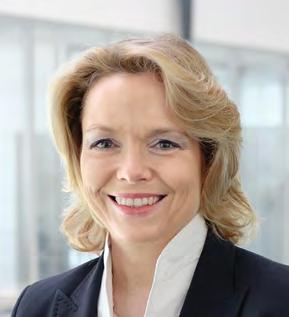
. Education creates opportunities. For well-trained skilled workers, however, jobs and employment prospects must also be created. The BDI recommends that the German government supports German companies in their activities in Sub-Saharan Africa. The establishment of local value chains makes a significant contribution to the demand for welltrained local specialists.
. A key challenge for Sub-Saharan Africa will be to adequately integrate the future employees into the domestic labour market. To this end, partnerships between companies and universities should be promoted, among other things. This ensures that the training of skilled workers meets the needs of the domestic labour market.
28 For comparison: In Europe, just under 19% of the population are minors.
29 Cf. Statista (2022b)
30 Cf. Statista (2022c)
31 Cf. Statista (2022d)
“The further training of local workers and the possibility of qualified training in the respective field are the foundations of sustainable projects in Africa. Various training concepts that are being implemented in different African countries prove this already. I am convinced that building up local know-how is a key success factor for German companies operating in Africa.”
Position | Africa policy | Continent of opportunities 31 Fresh start for German-African relations Create opportunities through education
Heike Bergmann
Senior Vice President, Voith Hydro
Correlate climate protection, nutrition, and food production
Africa could make a significant contribution to global food security. However, this requires increased production and investment.
Population growth continues unabated: By 2050, the world’s population is expected to grow from 7.6 billion today to 9.7 billion32, with 25 percent living in Africa. Feeding these people is a huge task in itself for the agricultural sector. It is exacerbated by the fight against climate change and the threat to biodiversity. Agricultural production must increase by 60 percent to ensure that the world can still be fed in 2050. 33 This was calculated by the Food and Agriculture Organization of the United Nations (FAO). The greatest potential can be found on the African continent. There is still a lot of land that could be used for agriculture. At the same time, from an ecological perspective and due to her biodiversity, Africa has the world’s greatest capacity to maintain and strengthen the balance of the biosphere
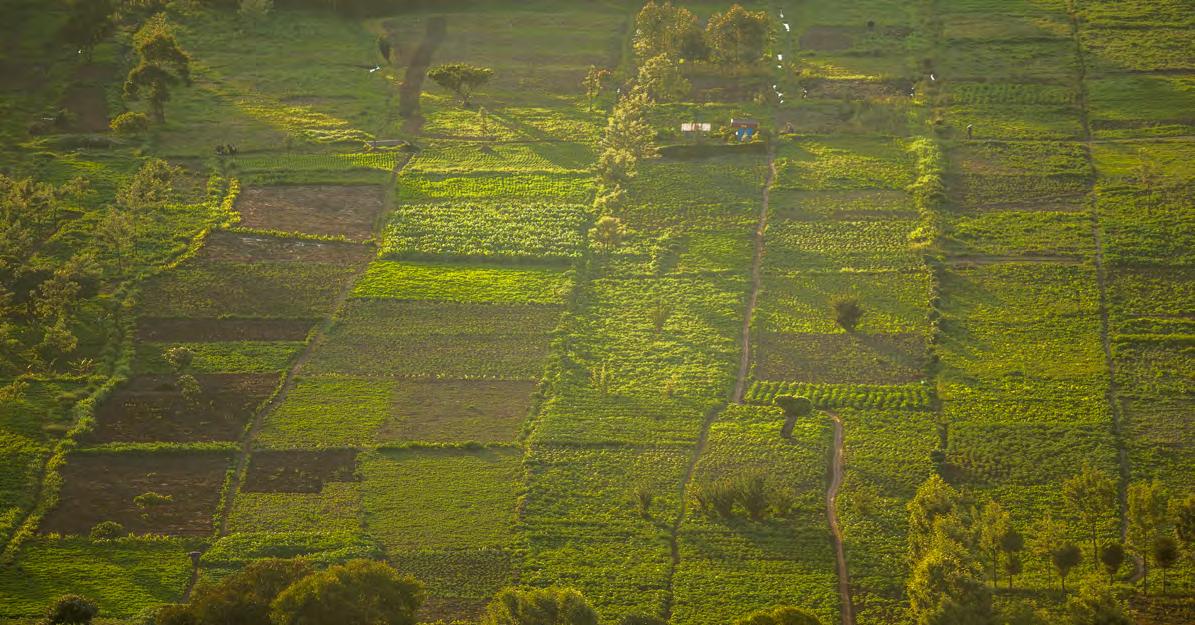
and prevent further depletion of the ozone layer. Therefore, the African continent plays a central role in solving the three global challenges of climate change, bio-diversity loss and nutrition.
Even before the Russian war of aggression on Ukraine, the number of people suffering from hunger in Africa was rising: This was due to the lack of rainy seasons, to droughts and the COVID-19 pandemic. The International Food Policy Research Institute estimates that there will be another 38 million people suffering from hunger in Africa by 2050 due to climate change alone. The institute also predicts that the continent will suffer significant food shortages repeatedly over the next two years and beyond, while malnutrition will continue to rise over the next 20 years.34 However, this must not be
32
32 Cf. United Nations (2022)
33 Cf. Food and Agriculture Organization of the United Nations (2009)
34 Cf. International Food Policy Research Institute (2021)
08
the case: Fertile soils and water are available - Africa could meet its own needs and she also has the potential to become a food exporter. However, this would require increases in production: On average, African farmers produce only one to two tons of grain per hectare. In Europe, America and Asia, yields have doubled since the 1960s to more than four tons per hectare. The reason for the misery in Africa is the low productivity of smallholders, who make up about 80 percent of farms and produce 70 percent of total food.35
This involves improving access to agricultural knowhow, products, and services for smallholder farmers in Africa, thereby contributing to higher yields, greater incomes, improved access to markets and climate change mitigation. This also includes more targeted promotion of digital agriculture by integrating digital technologies, such as the cell phone as a means of communication in conjunction with internet-based solutions that allow easier and faster access to financing for agricultural inputs throughout the value chain. However, there is also a need for increased local investment and access to adequate financing: Currently, less than 15 percent of lenders in Africa offer suitable services for smallholder farmers and agrobusinesses, even though economic growth in agriculture is said to be up to eleven times more effective in reducing poverty than growth in other sectors.36
While production must increase to feed a growing population, agricultural emissions must be reduced, deforestation and biodiversity loss halted. Modern plant breeding uses some of the most advanced technologies and procedures of our time. They are used to develop plants that are urgently needed to feed a growing population, conserve natural resources, protect the environment, and to preserve biodiversity. More climate-friendly crops
35 Cf. Frankfurter Allgemeine Zeitung (2018)
36 Cf. EURACTIV (2018)
with higher yields could reduce further dependence on food imports to Africa, as is currently the case with Ukraine and Russia.
Seven of the ten countries most affected by climate change are in Africa, yet farmers often lack access to innovations in agriculture.37 To create this access, support is needed for initiatives to equalise crops bred using NGT (New Genomic Techniques).

Recommendations for action
. The BDI is calling on the German federal government to provide targeted support for digital farming through the integration of digital technologies - such as the cell phone as a means of communication in conjunction with Internet-based solutions that make it easier and faster to access financing for agricultural inputs throughout the value chain.
. Facilitate financing and expand Hermes guarantees: Efficiency increases and higher yields are made possible by access to innovative technologies, and access to financial markets is a particular challenge within the agricultural sector in Africa. The BDI therefore recommends that African governments provide transparent and low-cost financing products, including for smallholders.
. Encouraging innovation: Supporting initiatives to equalise plants bred with the help of new genomic techniques (NGT). A ban on marketing in the European Union, but also on importing such products, does not provide incentives for further research and thus jeopardizes medium- and long-term food security both in Africa and globally.
37 Cf. German Watch (2021)
Position | Africa policy | Continent of opportunities 33 Fresh start for German-African relations Correlate climate protection, nutrition, and food production
Strengthen cooperation for prevention of pandemics 09
The African continent is suffering particularly from the economic and social consequences of the COVID-19 pandemic. Economic growth in the countries of Sub-Saharan Africa fell short of expectations in 2021, at 2.9 percent. In 2020, it even contracted for the first time in a quarter of a century. 38 Major economic sectors such as tourism and aviation collapsed completely due to travel restrictions, resulting in record unemployment. According to forecasts, the proportion of the population living in extreme poverty in Africa will increase to 460 million people because of the pandemic.39 Africa’s economy will be between 300 and 550 billion euros smaller in 2030 than it would have been without the pandemic.40 It is obvious: Africa urgently needs an economic recovery to bring millions of people out of poverty and into employment.
The key to economic recovery is to get the pandemic under control. Many African leaders strongly criticise the distribution of COVID-19 vaccines. In most African countries, vaccination rates remain low, with only 13 out of every 100 Africans vaccinated against the virus by mid-2022.41 By comparison, the figure in the EU is 75 out of every 100 people.42
To solve this problem, the establishment of vaccine production facilities at suitable locations in Africa could be a solution. In this context, the protection of intellectual property is a prerequisite for companies to invest in this cutting-edge technology. The COVAX initiative of the World Health Organization (WHO) and the African Union (AU) as well as BioNTech’s initiative are therefore particularly important. For example, BioNTech is building the first production facilities for mRNA-based vaccines in Africa. Starting with Rwanda, further production sites in Africa are to follow. COVAX procures,
38 Cf. World Bank (2021)
39 Cf. Statista (2022e)
40 Cf. Institute for Security Studies (2020)
41 Cf. World Health Organization (2022)
42 Cf. European Centre for Disease Prevention and Control (2022)
finances, and distributes vaccines for developing countries. Initiatives like his one are needed to distribute vaccines more equitably on a global scale. At the same time, the willingness to be vaccinated must increase in African countries. It is not enough to provide the vaccine doses. People must also want to be vaccinated. There is still work to be done in this area.
Lessons can be learned from the COVID-19 pandemic for future pandemics and crises. First, networks must be strengthened to detect pandemics before they break out and prevent them spreading. Secondly, economic impacts should be better addressed. The COVID-19 pandemic has shown that the private sector is an important partner in pandemic prevention, in preparedness and response, as well as in innovation, manufacturing and provision of health and public health products and services and should therefore be systematically involved.
African countries are leading the way in the discovery of new variants of the coronavirus, such as the omicron variant. Also, African scientists have a wealth of experience with other pathogens such as monkeypox. Collaborations for knowledge and technology transfer in medical research will make it possible to respond more effectively and efficiently to potential pandemics in the future.
Economically, African countries are heavily dependent on imports from China and exports of raw materials to China. The demand shock caused by the outbreak of the COVID-19 pandemic hit many African countries hard. To make Sub-Saharan Africa’s economy more crisis-proof in the future, African states should intensify their efforts to broaden economic production and trade. Protectionism is a dead end in this regard. Diversified, international economic relations, on the other hand, can sustainably strengthen development in Sub-Saharan Africa. Health expenditure must also be increased and access to medical care improved.
34
The COVID-19 pandemic has slowed economic growth on the African continent. Now, the task is to rapidly increase the vaccination rate and make the economy crisis-proof.
Recommendations for action
. Further strengthening of multilateralism (e.g. WHO) and intersectoral collaboration is needed for responses to COVID-19 and future pandemics. The cross-sectoral ”OneHealth” approach should receive more attention.
. The BDI encourages the German government to support the fair and global distribution of vaccines. Continued support for the COVAX initiative is central.
. The BDI recommends investing in prevention of pandemics. This is much more sustainable and cost-effective than having to respond to a pandemic outbreak. Strengthening health systems worldwide as well as in Sub-Saharan Africa can avert the risk of further epidemics with serious consequences. Measures can include educating the population, training local professionals, and adequately equipping regional facilities such as hospitals and doctors’ offices.
. The BDI welcomes initiatives such as those of BioNTech, which advocate stronger and more intense medical cooperation. To prevent pandemics successfully, all countries must have access to vaccines.
. The BDI recommends improving the cross-border exchange of information and data. This is useful to ensure the supply of medical equipment and to enable a scientifically sound response to COVID-19 and future diseases.
. The BDI is in favour of an appropriate prevention of the economic impact of pandemics. This includes diversifying Africa’s trading partners and reducing tariff and non-tariff barriers to trade.
35 Fresh start for German-African relations Position | Africa policy | Continent of opportunities Strengthen cooperation for prevention of pandemics
Sources
AfCFTA: AfCFTA contributions to the African Economy. Aufgerufen am 15. August 2022. https://au-afcfta.org/purpose-the-afcfta/#:~:text=AfCFTA%20contributions%20to%20the%20African%20 Economy%20It%20is,this%20trade%20if%20non-tariff%20barriers%20 are%20also%20reduced.
African Development Bank Group: Climate Change in Africa. Aufgerufen am 10. Oktober 2022. https://www.afdb.org/en/cop25/climate-changeafrica
African Development Bank: Africa’s Infrastructure: Great Potential but Little Impact on Inclusive Growth. 2018. https://www.afdb.org/en/ knowledge/publications/tracking-africa%E2%80%99s-progress-in-figures/infrastructure-development
Bundesministerium für Wirtschaft und Klimaschutz: Exportkreditgarantien Jahresbericht 2021. April 2021. https://www.erneuerbareenergien.de/Redaktion/DE/Downloads/E/exportkreditgarantien-jahresbericht-2021.pdf?__blob=publicationFile&v=6
Bundesregierung: Die Nationale Wasserstoffstrategie. Juni 2020. https:// www.bmwk.de/Redaktion/DE/Publikationen/Energie/die-nationalewasserstoffstrategie.pdf?__blob=publicationFile&v=20
Bundesverband der Deutschen Industrie: Analyse bestehender Abhängigkeiten und Handlungsempfehlungen. 2022. https://bdi.eu/publikation/ news/analyse-bestehender-abhaengigkeiten-und-handlungsempfehlungen/
Business Insider South Africa. Africa is poised to be a significant player in the new space age - here’s why. 19. September 2021. https://www.businessinsider.co.za/africa-space-age-tourism-exploration-governance-2021-9
Deutsche Welle: EU reveals €150 Billion investment plan for Africa. 02. Oktober 2022. https://www.dw.com/en/eu-reveals-150-billion-investment-plan-for-africa/a-60731816
EURACTIV: Die Landwirtschaft als Schlüsselfaktor für Afrikas Aufstieg. 28. September 2018. https://de.euractiv.eu/wp-content/uploads/sites/4/ special-report/EURACTIV-Special-Report-Die-Landwirschaft-als-Schlusselfaktor-fur-Afrikas-Aufstieg.pdf
European Centre for Disease Prevention and Control: Cumulative uptake (%) of the primary course in the total population in EU/EEA countries as of 2022-06-30. 13. Juli 2022. https://www.ecdc.europa.eu/en
Food and Agriculture Organization of the United Nations: Global agriculture towards 2050. 12. Oktober 2009. https://www.fao.org/fileadmin/ templates/wsfs/docs/Issues_papers/HLEF2050_Global_Agriculture.pdf
Frankfurter Allgemeine Zeitung: In Afrika müsste niemand hungern. 09. August 2018. https://www.faz.net/aktuell/wirtschaft/arm-und-reich/landwirtschaft-in-afrikanischen-laendern-birgt-viel-potential-15728884.html
German Institute for Global and Area Studies: Entwicklungszusammenarbeit in Afrika: mehr Kohärenz wagen. 2021/ Menschenrechte und unternehmerische Sorgfaltspflichten Gutachten des Wissenschaftlichen Beirats beim Bundesministerium für Wirtschaft und Klimaschutz (BMWK). 2022 https://www.giga-hamburg.de/de/publikationen/giga-focus/entwicklungszusammenarbeit-mit-afrika-mehr-kohaerenz-wagen
Germany Trade and Invest: Deutsche Investitionen steigen weiter. 17. Mai 2021. https://www.gtai.de/de/trade/afrika-uebergreifend/ wirtschaftsumfeld/deutsche-investitionen-in-afrika-steigen-weiter650130#:~:text=Allein%20in%20der%20Republik%20am,sind%20 BMW%2C%20Daimler%20und%20Volkswagen
Germany Trade & Invest: Wirtschaftsdaten Kompakt, Kongo (Dem. Rep.). 31. Mai 2022c. https://www.gtai.de/de/trade/kongo-demokratische-republik/wirtschaftsumfeld/wirtschaftsdaten-kompakt-kongodem-rep--156794
Germany Trade & Invest: Wirtschaftsdaten Kompakt, Guinea. 31. Mai 2022a. https://www.gtai.de/de/trade/guinea/wirtschaftsumfeld/wirtschaftsdaten-kompakt-guinea-179898
Germany Trade & Invest: Wirtschaftsdaten Kompakt, Südafrika. 31. Mai 2022b. https://www.gtai.de/de/trade/suedafrika/wirtschaftsumfeld/wirtschaftsdaten-kompakt-suedafrika-156832
German Watch: Globaler Klima-Risiko-Index 2021. Januar 2021. https:// germanwatch.org/sites/default/files/Zusammenfassung%20des%20 Klima-Risiko-Index%202021_0.pdf
GSMA: The Mobile Economy Sub-Saharan Africa. 2021. https://data. gsmaintelligence.com/research/research/research-2021/the-mobile-economy-sub-saharan-africa-2021
Hauptverband der Deutschen Bauindustrie: Bauindustrie in Afrika. 2020. https://www.bauindustrie.de/themen/news-detail/bauindustrie-in-afrika Institute for Security Studies: Impact of Covid-19 in Africa – A scenario analysis to 2030. Juli 2020. https://papers.ssrn.com/sol3/papers.cfm?abstract_id=3660866
International Food Policy Research Institute: Increased hunger due to climate change out to mid-century can be averted with dedicated investments in the agricultural sector. 22. Juni 2021. https://www.ifpri.org/ news-release/new-study%C2%A0increased-hunger-due-climate-changeout-mid-century-can-be-averted-dedicated
McKinsey: Solving Africa’s infrastructure paradox. 6. März 2020. https:// www.mckinsey.com/capabilities/operations/our-insights/solving-africasinfrastructure-paradox
OECD: 2022 Report on the Implementation of the DAC Recommendation on Untying Official Development Assistance. 04. Mai 2022. https:// one.oecd.org/document/C(2022)98/en/pdf
Statista: Alphabetisierungsrate unter Erwachsenen nach Weltregionen im Jahr 2020. Aufgerufen am 29. September 2022c. https://de.statista. com/statistik/daten/studie/232631/umfrage/alphabetisierungsrate-untererwachsenen-nach-weltregionen/
Statista: Anteil der Kinder und Jugendlichen (0- bis 17-Jährige) an der Gesamtbevölkerung, aufgeschlüsselt nach Altersgruppen und Kontinenten im Jahr 2022. 01. Juli 2022b. https://de.statista.com/statistik/daten/ studie/1020714/umfrage/anteil-der-kinder-und-jugendlichen-an-der-weltbevoelkerung-nach-altersgruppen/
Statista: Internet in Africa: Progress and Potential. 4. Februar 2022a. https://www.statista.com/chart/26781/internet-penetration-africa-progress/
Statista: Number of People living below the extreme poverty line in Africa from 2016 to 2027. 4. Mai 2022e. https://www.statista.com/statistics/1228533/number-of-people-living-below-the-extreme-poverty-linein-africa/
Statista: Unemployment rate in Africa by country 2022. Aufgerufen am 29. September 2022d. https://www.statista.com/statistics/1286939/unemployment-rate-in-africa-by-country/
The Economist: Africa’s population will double by 2050. 26. März 2020. https://www.economist.com/special-report/2020/03/26/africas-population-will-double-by-2050
United Nations: World Population to reach 8 billion this year, as growth rate slows. 11. Juli 2022. https://news.un.org/en/story/2022/07/1122272
World Bank: Global Recovery Strong but Uneven as Many Developing Countries Struggle with the Pandemic’s Lasting Effects. 08. Juni 2021. https://www.worldbank.org/en/news/feature/2021/06/08/the-globaleconomy-on-track-for-strong-but-uneven-growth-as-covid-19-still-weighs
World Bank: The African Continental Free Trade Area. Economic and Distributional Effects. 27. Juli 2020. https://openknowledge.worldbank. org/bitstream/handle/10986/34139/9781464815591.pdf
World Bank Data Base: GDP growth (annual %) – Sub-Saharan Africa, World. 13 Juli 2022a. https://data.worldbank.org/indicator/NY.GDP. MKTP.KD.ZG?locations=ZG-1W
World Bank Data Base: Inflation, GDP deflator (annual %) – Sub-Saharan Africa, World. 13 Juli 2022b. https://data.worldbank.org/indicator/ NY.GDP.DEFL.KD.ZG?locations=ZG
World Health Organization: Covid-19 Vaccination in the WHO African Region. März 2022. https://reliefweb.int/report/algeria/covid-19-vaccination-who-african-region-monthly-bulletin-march-2022
36 Sources Fresh start for German-African relations Position | Africa policy | Continent of opportunities
2022. https://au-afcfta.org/purpose-the-afcfta/#:~:text=AfCFTA%20contributions%20to%20the%20African%20Economy%20It%20is,this%20 trade%20if%20non-tariff%20barriers%20are%20also%20reduced.
African Development Bank Group: Climate Change in Africa. Aufgerufen am 10. Oktober 2022. https://www.afdb.org/en/cop25/climate-changeafrica
African Development Bank: Africa’s Infrastructure: Great Potential but Little Impact on Inclusive Growth. 2018. https://www.afdb.org/en/ knowledge/publications/tracking-africa%E2%80%99s-progress-in-figures/infrastructure-development
Bundesministerium für Wirtschaft und Klimaschutz: Exportkreditgarantien Jahresbericht 2021. April 2021. https://www.erneuerbareenergien.de/Redaktion/DE/Downloads/E/exportkreditgarantien-jahresbericht-2021.pdf?__blob=publicationFile&v=6
Bundesregierung: Die Nationale Wasserstoffstrategie. Juni 2020. https:// www.bmwk.de/Redaktion/DE/Publikationen/Energie/die-nationalewasserstoffstrategie.pdf?__blob=publicationFile&v=20
Bundesverband der Deutschen Industrie: Analyse bestehender Abhängigkeiten und Handlungsempfehlungen. 2022. https://bdi.eu/publikation/ news/analyse-bestehender-abhaengigkeiten-und-handlungsempfehlungen/
Business Insider South Africa. Africa is poised to be a significant player in the new space age - here’s why. 19. September 2021. https://www.businessinsider.co.za/africa-space-age-tourism-exploration-governance-2021-9
Deutsche Welle: EU reveals €150 Billion investment plan for Africa. 02. Oktober 2022. https://www.dw.com/en/eu-reveals-150-billion-investment-plan-for-africa/a-60731816
EURACTIV: Die Landwirtschaft als Schlüsselfaktor für Afrikas Aufstieg. 28. September 2018. https://de.euractiv.eu/wp-content/uploads/sites/4/ special-report/EURACTIV-Special-Report-Die-Landwirschaft-als-Schlusselfaktor-fur-Afrikas-Aufstieg.pdf
European Centre for Disease Prevention and Control: Cumulative uptake (%) of the primary course in the total population in EU/EEA countries as of 2022-06-30. 13. Juli 2022. https://www.ecdc.europa.eu/en
Food and Agriculture Organization of the United Nations: Global agriculture towards 2050. 12. Oktober 2009. https://www.fao.org/fileadmin/ templates/wsfs/docs/Issues_papers/HLEF2050_Global_Agriculture.pdf
Frankfurter Allgemeine Zeitung: In Afrika müsste niemand hungern. 09. August 2018. https://www.faz.net/aktuell/wirtschaft/arm-und-reich/landwirtschaft-in-afrikanischen-laendern-birgt-viel-potential-15728884.html
German Institute for Global and Area Studies: Entwicklungszusammenarbeit in Afrika: mehr Kohärenz wagen. 2021/ Menschenrechte und unternehmerische Sorgfaltspflichten Gutachten des Wissenschaftlichen Beirats beim Bundesministerium für Wirtschaft und Klimaschutz (BMWK). 2022 https://www.giga-hamburg.de/de/publikationen/giga-focus/entwicklungszusammenarbeit-mit-afrika-mehr-kohaerenz-wagen
Germany Trade and Invest: Deutsche Investitionen steigen weiter. 17. Mai 2021. https://www.gtai.de/de/trade/afrika-uebergreifend/ wirtschaftsumfeld/deutsche-investitionen-in-afrika-steigen-weiter650130#:~:text=Allein%20in%20der%20Republik%20am,sind%20 BMW%2C%20Daimler%20und%20Volkswagen
Germany Trade & Invest: Wirtschaftsdaten Kompakt, Kongo (Dem. Rep.). 31. Mai 2022c. https://www.gtai.de/de/trade/kongo-demokratische-republik/wirtschaftsumfeld/wirtschaftsdaten-kompakt-kongodem-rep--156794
Germany Trade & Invest: Wirtschaftsdaten Kompakt, Guinea. 31. Mai 2022a. https://www.gtai.de/de/trade/guinea/wirtschaftsumfeld/wirtschaftsdaten-kompakt-guinea-179898
Germany Trade & Invest: Wirtschaftsdaten Kompakt, Südafrika. 31. Mai 2022b. https://www.gtai.de/de/trade/suedafrika/wirtschaftsumfeld/wirtschaftsdaten-kompakt-suedafrika-156832
German Watch: Globaler Klima-Risiko-Index 2021. Januar 2021. https:// germanwatch.org/sites/default/files/Zusammenfassung%20des%20 Klima-Risiko-Index%202021_0.pdf
GSMA: The Mobile Economy Sub-Saharan Africa. 2021. https://data. gsmaintelligence.com/research/research/research-2021/the-mobile-economy-sub-saharan-africa-2021
Hauptverband der Deutschen Bauindustrie: Bauindustrie in Afrika. 2020. https://www.bauindustrie.de/themen/news-detail/bauindustrie-in-afrika Institute for Security Studies: Impact of Covid-19 in Africa – A scenario analysis to 2030. Juli 2020. https://papers.ssrn.com/sol3/papers.cfm?abstract_id=3660866
International Food Policy Research Institute: Increased hunger due to climate change out to mid-century can be averted with dedicated investments in the agricultural sector. 22. Juni 2021. https://www.ifpri.org/ news-release/new-study%C2%A0increased-hunger-due-climate-changeout-mid-century-can-be-averted-dedicated
McKinsey: Solving Africa’s infrastructure paradox. 6. März 2020. https:// www.mckinsey.com/capabilities/operations/our-insights/solving-africasinfrastructure-paradox
OECD: 2022 Report on the Implementation of the DAC Recommendation on Untying Official Development Assistance. 04. Mai 2022. https:// one.oecd.org/document/C(2022)98/en/pdf
Statista: Alphabetisierungsrate unter Erwachsenen nach Weltregionen im Jahr 2020. Aufgerufen am 29. September 2022c. https://de.statista. com/statistik/daten/studie/232631/umfrage/alphabetisierungsrate-untererwachsenen-nach-weltregionen/
Statista: Anteil der Kinder und Jugendlichen (0- bis 17-Jährige) an der Gesamtbevölkerung, aufgeschlüsselt nach Altersgruppen und Kontinenten im Jahr 2022. 01. Juli 2022b. https://de.statista.com/statistik/daten/ studie/1020714/umfrage/anteil-der-kinder-und-jugendlichen-an-der-weltbevoelkerung-nach-altersgruppen/
Statista: Internet in Africa: Progress and Potential. 4. Februar 2022a. https://www.statista.com/chart/26781/internet-penetration-africa-progress/
Statista: Number of People living below the extreme poverty line in Africa from 2016 to 2027. 4. Mai 2022e. https://www.statista.com/statistics/1228533/number-of-people-living-below-the-extreme-poverty-linein-africa/
Statista: Unemployment rate in Africa by country 2022. Aufgerufen am 29. September 2022d. https://www.statista.com/statistics/1286939/unemployment-rate-in-africa-by-country/
The Economist: Africa’s population will double by 2050. 26. März 2020. https://www.economist.com/special-report/2020/03/26/africas-population-will-double-by-2050
United Nations: World Population to reach 8 billion this year, as growth rate slows. 11. Juli 2022. https://news.un.org/en/story/2022/07/1122272
World Bank: Global Recovery Strong but Uneven as Many Developing Countries Struggle with the Pandemic’s Lasting Effects. 08. Juni 2021. https://www.worldbank.org/en/news/feature/2021/06/08/the-globaleconomy-on-track-for-strong-but-uneven-growth-as-covid-19-still-weighs World Bank: The African Continental Free Trade Area. Economic and Distributional Effects. 27. Juli 2020. https://openknowledge.worldbank. org/bitstream/handle/10986/34139/9781464815591.pdf
World Bank Data Base: GDP growth (annual %) – Sub-Saharan Africa, World. 13 Juli 2022a. https://data.worldbank.org/indicator/NY.GDP. MKTP.KD.ZG?locations=ZG-1W
World Bank Data Base: Inflation, GDP deflator (annual %) – Sub-Saharan Africa, World. 13 Juli 2022b. https://data.worldbank.org/indicator/ NY.GDP.DEFL.KD.ZG?locations=ZG
World Health Organization: Covid-19 Vaccination in the WHO African Region. März 2022. https://reliefweb.int/report/algeria/covid-19-vaccination-who-african-region-monthly-bulletin-march-2022
37 Fresh start for German-African relations Sources Position | Africa policy | Continent of opportunities
Imprint
Publisher Federation of German Industries
Breite Straße 29
10178 Berlin
T.: +49 30 2028-0 www.bdi.eu
Editorial
Matthias Wachter, Head of Department International Cooperation, Raw Materials, Security and Space
Eva Gauß, Senior Manager, Sub-Saharan Africa Division International Cooperation, Raw Materials, Security and Space
Lara Petersen, Senior Manager, Sub-Saharan Africa Division International Cooperation, Raw Materials, Security and Space
Jonathan Kaupenjohann, Student Assistant Sub-Saharan Africa Division International Cooperation, Raw Materials, Security and Space
Conception & Implementation
Sarah Schwake, Senior Manager Marketing, Online and Events Department
Print
Das Druckteam www.druckteam-berlin.de
Publishing Company
Industrie-Förderung Gesellschaft mbH, Berlin
Image Credits
P. 1: 194005435 | ©JohanSwanepoel | stock.adobe.com
P. 4: 251406638 | ©Igor Groshev | stock.adobe.com
P. 10: 313796951 | ©Pierre-Yves Babelon | stock.adobe.com
P. 12: 358826225 | ©AS Photo Project | stock.adobe.com
P. 16: 198506252 | ©Sunshine Seeds | stock.adobe.com
P. 20: 55237017 | ©JohanSwanepoel | stock.adobe.com
P. 24: 2vPGGOU-wLA | unsplash.com
P. 30: 286485423 | ©Riccardo Niels Mayer | stock.adobe.com
P .32: 135431998 | ©malajscy | stock.adobe.com
Date and Number
November 2022
BDI-Publications-Nr. 120
Imprint 38
Fresh start for German-African relations Position | Africa policy | Continent of opportunities
The BDI on Social Media Follow our latest articles on social media. We appreciate likes, retweets and comments. Newsletter bdi.eu/media/newsletter-abo Twitter Facebook @Der_BDI www.facebook.com/DerBDI LinkedIn linkedin.com/company/ bdi-bundesverband-derdeutschen-industrie-e-v-/





 Wolfgang Niedermark Member of the Executive Board, BDI
Marie-Christine von Hahn Chair of the BDI Working Group “Development Policy”
Wolfgang Niedermark Member of the Executive Board, BDI
Marie-Christine von Hahn Chair of the BDI Working Group “Development Policy”


















